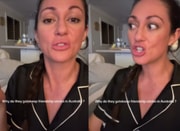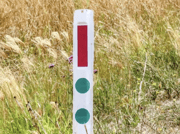New ‘R’ plates give people a second chance after road trauma
By
- Replies 9
We've all seen the news stories: the horrific car accidents, the fatal pedestrian collisions, the devastating highway pileups. It's no wonder that some of us are scared of driving again.
The dangers we can encounter on the road are many and varied. From distracted drivers to drunk drivers to aggressive drivers to simply bad weather conditions, the risks are real and ever-present.
And for those of us who have survived a car crash, the anxiety can be even worse. You may have flashbacks or nightmares of the accident and may be afraid to get behind the wheel again.
But we can't let our fear keep us from living our lives. We have to face our fears and get back out on the road.
Thankfully, there's now some help available for those affected by road trauma in Australia, in the form of new 'R' plates that have been introduced by mycar – formerly Kmart Tyre & Auto.

The new ‘R’ plates assist returning drivers who experienced or are experiencing road trauma. Credit: mycar.
The R plates, also known as 'return' plates, are designed to help drivers who are returning to driving after an accident or taking a long break from driving.
The plates are also made to raise awareness among other drivers that someone on the road may need more care and understanding than usual.
According to a 1000-person poll conducted by Pureprofile in August of this year, three-quarters of Australians have been impacted by a traffic event (such as an accident).
With 21 per cent of those surveyed taking at least six months before feeling comfortable driving again, it's clear that more needs to be done when it comes to helping people recover from road trauma.
In addition, 66 per cent of Australians surveyed stated they felt safer learning to drive with visible L or P plates on their car because other drivers would give them more room.
This prompted mycar to provide support to these individuals, pointing out that while the initiative is crucial for them, there are no other groups that are extending their help to struggling Australians.

Experts applaud the initiative for recognising a significant element of Australian road safety. Credit: mycar.
'We care for those with physical injuries from a road incident, but we rarely consider the mental toll road trauma can take,' a mycar spokesperson said.
'The R plate signifies to other road users that the driver may need some extra care, giving them time and space to recover.'
'Recovering drivers can confidently return to the road knowing they are in a supportive space.'
Dr Jason Thompson, an associate professor at the University of Melbourne, said the initiative acknowledges a crucial factor on Australian roads.
He remarked: 'The journey through to recovery, and a return to confidence is unique to each individual and often takes time.'
'Returning to the road can be a scary and a nerve-wracking experience, so even just having those feelings recognised could help people in their recovery.'
For those of you who are looking to get the R plates, you may order them for free and print them at home through the mycar website.
We all have a responsibility to ensure that our roads are safe. Every time we get behind the wheel of a car, we are taking on a risk. But, by following some simple safety guidelines, we can help to make sure that the risk is minimised.
So, there you have it, members! Do you think this initiative will provide the support needed for those who are experiencing road trauma? Or should the government do more to address this issue?
The dangers we can encounter on the road are many and varied. From distracted drivers to drunk drivers to aggressive drivers to simply bad weather conditions, the risks are real and ever-present.
And for those of us who have survived a car crash, the anxiety can be even worse. You may have flashbacks or nightmares of the accident and may be afraid to get behind the wheel again.
But we can't let our fear keep us from living our lives. We have to face our fears and get back out on the road.
Thankfully, there's now some help available for those affected by road trauma in Australia, in the form of new 'R' plates that have been introduced by mycar – formerly Kmart Tyre & Auto.
The new ‘R’ plates assist returning drivers who experienced or are experiencing road trauma. Credit: mycar.
The R plates, also known as 'return' plates, are designed to help drivers who are returning to driving after an accident or taking a long break from driving.
The plates are also made to raise awareness among other drivers that someone on the road may need more care and understanding than usual.
According to a 1000-person poll conducted by Pureprofile in August of this year, three-quarters of Australians have been impacted by a traffic event (such as an accident).
With 21 per cent of those surveyed taking at least six months before feeling comfortable driving again, it's clear that more needs to be done when it comes to helping people recover from road trauma.
In addition, 66 per cent of Australians surveyed stated they felt safer learning to drive with visible L or P plates on their car because other drivers would give them more room.
This prompted mycar to provide support to these individuals, pointing out that while the initiative is crucial for them, there are no other groups that are extending their help to struggling Australians.
Experts applaud the initiative for recognising a significant element of Australian road safety. Credit: mycar.
'We care for those with physical injuries from a road incident, but we rarely consider the mental toll road trauma can take,' a mycar spokesperson said.
'The R plate signifies to other road users that the driver may need some extra care, giving them time and space to recover.'
'Recovering drivers can confidently return to the road knowing they are in a supportive space.'
Dr Jason Thompson, an associate professor at the University of Melbourne, said the initiative acknowledges a crucial factor on Australian roads.
He remarked: 'The journey through to recovery, and a return to confidence is unique to each individual and often takes time.'
'Returning to the road can be a scary and a nerve-wracking experience, so even just having those feelings recognised could help people in their recovery.'
For those of you who are looking to get the R plates, you may order them for free and print them at home through the mycar website.
We all have a responsibility to ensure that our roads are safe. Every time we get behind the wheel of a car, we are taking on a risk. But, by following some simple safety guidelines, we can help to make sure that the risk is minimised.
So, there you have it, members! Do you think this initiative will provide the support needed for those who are experiencing road trauma? Or should the government do more to address this issue?







